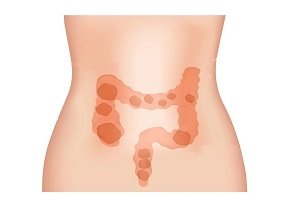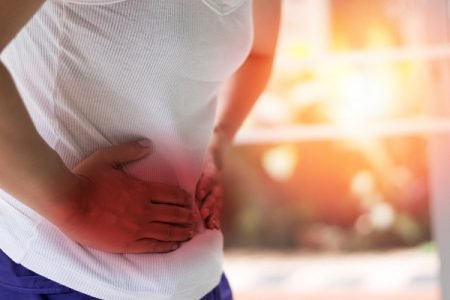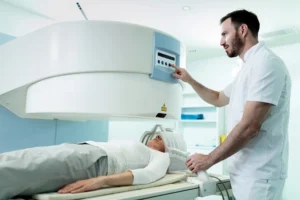Types of Constipation
- Updated on: Jul 5, 2024
- 4 min Read
- Published on Feb 11, 2020

The passage of very small amounts of hard, dry bowel movements, usually fewer than three times a week is referred to as constipation. It is very difficult and painful to have a bowel movement in people who are constipated.
Some of the symptoms of constipation include lower abdominal pain and discomfort, rectal bleeding, hard stools caused by anal fissures, and a sense of incomplete evacuation after a bowel movement. It can be chronic, sometimes severe, and has a significant, debilitating effect on the quality of life.
In elderly patients, constipation is a significant health-care problem and in the majority of cases, chronic constipation is aggravating, but not life-threatening.
The normal range of passing the stools is from three times daily to three times a week.
What are the Different Types of Constipation?
There are mainly three types of constipation:
Normal Transit Constipation
Normal transit constipation is one of the most common types of constipation. In this type, colon muscles squeeze and relax neither too fast nor too slow. The waste moves with the right speed. Still, the consistency of stools can be hard and difficult to pass.
Normal transit constipation has also been associated with increased psychosocial stress. It gets better by eating more fiber-rich foods or by using a certain type of laxative.
The symptoms of normal transit constipation are generally associated with abdominal discomfort, pain and bloating.
Slow Transit Constipation
Slow transit constipation is characterized by the reduced mortality of large intestine that is because of abnormalities of the enteric nerves. In this type of constipation, the passage of waste moves slowly which leads to various chronic problems such as uncontrollable soiling.
The treatment option includes electrical stimulation, laxatives, and surgery.
Symptoms of Slow Transit Constipation
- Bowel movement less than once a week
- Passing hard and dry stools
- Pain and bloating
- Nausea
- Poor appetite
Dyssynergic Constipation
In this type of constipation, patients face difficulty in expelling stools from the rectum. This may be due to impaired rectal contraction, anal contraction, or inadequate anal relaxation.
The difficulty in passing stools can also be due to the problem with the nerves of the pelvic floor. The lack of coordination of the muscles that are involved in defecation may be the most common cause, but a high proportion of patients also show impaired rectal sensation.
Symptoms of Dyssynergic Constipation
- Very hard stools
- Excessive straining
- Less than three bowel movements per week
- Digital evacuation
- The feeling of incomplete evacuation
Difference Between Painless and Painful Constipation
Constipation can be painless or painful. The painless or mild pain constipation is also called functional constipation and is defined by the presence of bowel symptoms such as excessive straining to defecate.
Painful or moderate to severe abdominal pain constipation is referred to as constipation-predominant IBS and defecation disorder and is characterized by severe abdominal pain associated with bowel disturbances and the relief of pain is with defecation.
As compared to painless constipation patients, painful constipation patients had more prominent bowel symptoms and were more likely to have upper gastrointestinal symptoms including:
- Dysphagia
- Dyspepsia
- Anorectal symptoms
- Sexual symptoms
- Anxiety
- Depression
- Slower rectosigmoid transit
The symptoms of painful constipation can partly reflect the increased perception of visceral sensations such as wall tension.
When can Constipation Lead to an Emergency Situation?
Constipation is generally a short-term problem that can be resolved with self-care, but sometimes it leads to emergency medical treatment such as in the following situations:
- When stools become hardened and lodged in the rectum. These severe complications can lead to bleeding.
- The bowel obstruction occurs when the small or large intestine becomes partially or fully blocked which cause stretching of the intestines which can lead to severe abdominal pain, rupture, and bleeding.
- Unbearable abdominal pain which can also be due to another disease such as appendicitis or bowel obstruction.
- The presence of blood in the stool can also be a cause of rectal bleeding which includes fissures, hemorrhoids, rectal ulcers, and rectal inflammation.
- When constipation lasted for a longer duration for more than three weeks.
FAQs
What is the sign of constipation?
Each individual with constipation experience symptoms differently. The most common sign of constipation is when there are fewer than three bowel movements in a week because of the contents in the intestines that may harden making it difficult or even painful to pass. Straining during bowel movements or the feeling of incomplete emptying also may be considered a sign of constipation.
What can cause severe constipation?
Poor diet and lack of exercise are one of the important causes of constipation. People who exercise daily generally don't develop constipation because the colon responds to activity. Good muscle tone, in general, is important for regular bowel movements. The abdominal wall muscles and the diaphragm all play a crucial role in the process of defecation. If these muscles are weak, they will not be able to perform their job. Increasing exercise to improve constipation may be one of the most effective treatment methods in older people. Other causes include irritable bowel syndrome, pregnancy, laxative abuse, hormonal disturbances, loss of body salts and nerve damage.
When should I go to the doctor for constipation?
If you have sudden complications like abdominal pain and severe cramps and you are not able to pass gas or stool, you need to contact your doctors. Other complications include:
- Blood in stool
- Unexpected weight loss
- Severe pain with bowel movements
- When constipation lasts for more than two weeks
- In case of very thin stools
Is yogurt good for constipation?
Yogurt contains microorganisms known as probiotics. Probiotics are called good bacteria. They usually help to improve gut health and soften stools. According to researches, the unflavoured probiotic yogurt helps to treat constipation. An advantage ofyogurt is that it is light on the stomach and easier to digest. Eating yogurt each morning for 2 weeks shortened the time it took waste to move through the bowels in people with chronic constipation.











